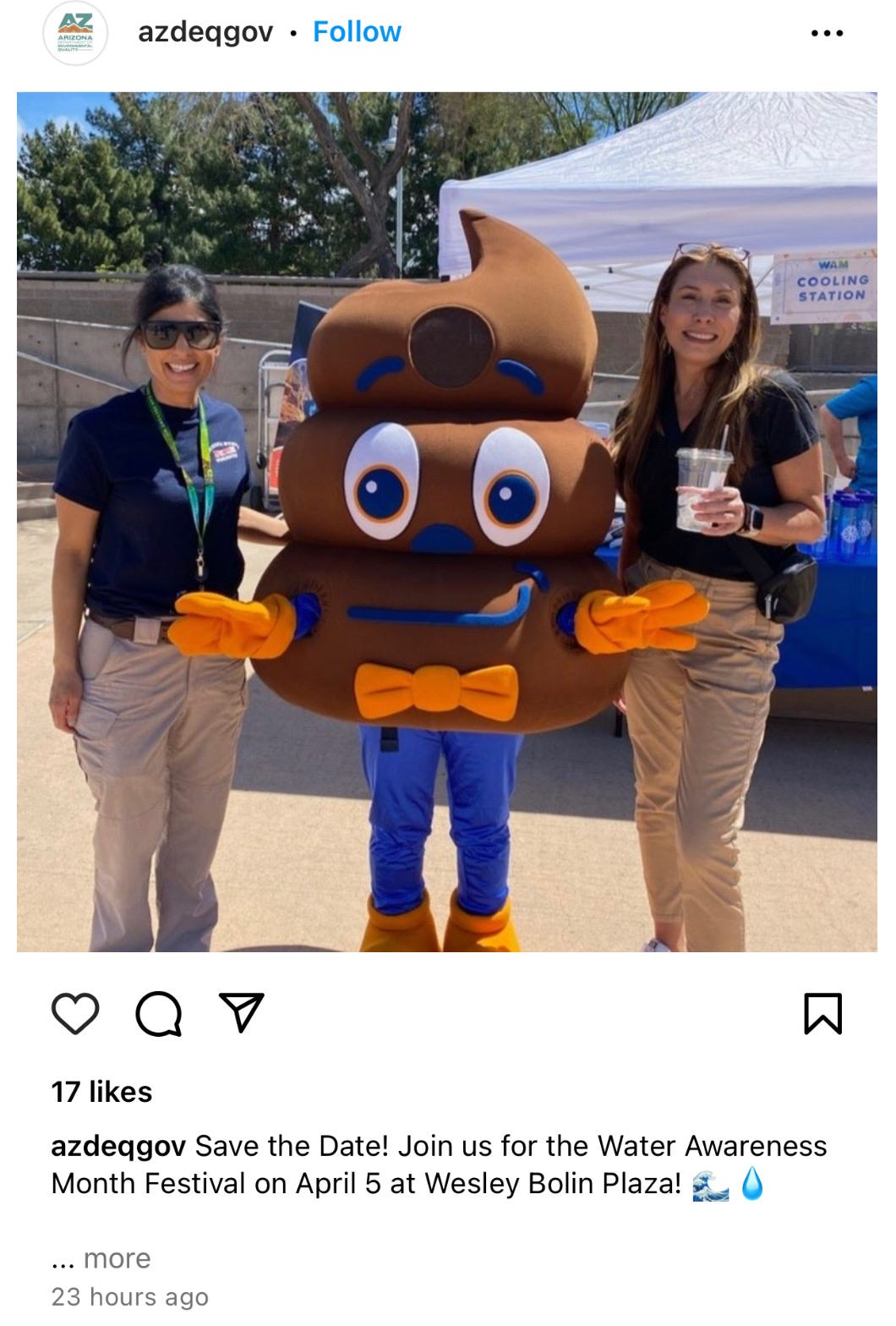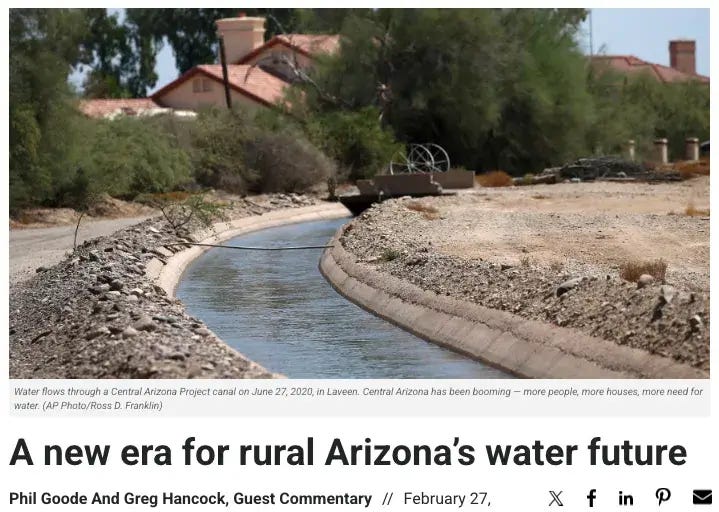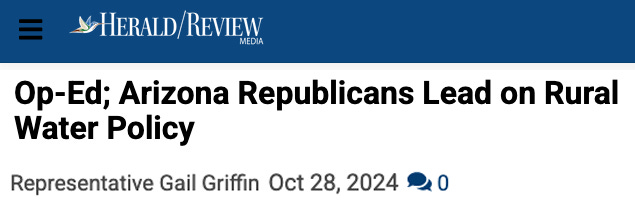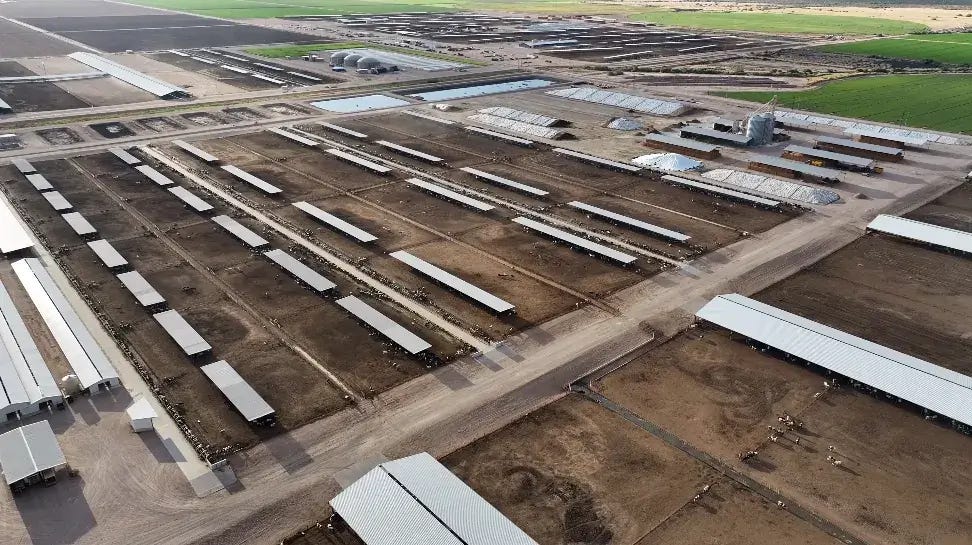Liquidate the Locals
Editorial ping-pong ... Big Ag's wish list ... And the aquifer is dead — long live tilapia!
Last month, we told you about the Rural Groundwater Management Act, a bipartisan proposal to fix Arizona’s leaky rural groundwater laws.
The Act never got a hearing in this legislative session. But the Farm Bureau’s alternative proposal, SB1520, passed through the Senate Natural Resources Committee. The bill is a reworking of their previous groundwater management proposal, last year’s widely panned SB1221.
Today, we’ll take a closer look at SB1520, and how it purposely avoids doing anything about foreign water users like Fondomonte and California orchard barons.
But first — let’s look at what the stakeholders are saying on this topic in the opinion pages.
Substacker and friend of the Agendaverse, Robert Robb, recently published an opinion titled “Hobbs should accede on rural groundwater management” wherein he argues that “Democrats” will need to make many more concessions to the Republican opponents of the Rural Groundwater Management Act and allow for more “local control”.
The problem is, many local rural Republicans support the Hobbs-backed Rural Groundwater Management Act over the Farm Bureau-backed alternative, SB1520. And they sounded off in response to Robb.
Robb’s Reality Check
Robb admits that the “prevailing narrative in political circles is favorable to Hobbs’s description of the state of play.” Folks are pinning Rep. Gail Griffin as the immovable object in negotiations.
“According to the narrative, Hobbs and Democratic legislators want to do something about rural groundwater overdrafts but are thwarted by legislative Republicans, particularly Gail Griffin, chairwoman of House Natural Resources, Energy, and Water Committee.
The prevailing narrative is neither accurate nor fair. The GOP Legislature has a reasonable proposal to address rural groundwater overdrafts, embodied in a bill last session, Senate Bill 1221,” Robb wrote.
He goes on to say that the competing regulatory proposals have a “great deal of similarity and overlap,” but that Hobbs won’t win on “the most important differences.”
“The right course of action is for Democrats to support, or at least allow to become law, the GOP approach of empowering local councils with at least a modicum of democratic accountability to the local population,” he wrote.
However, many representatives of those “local populations” don’t feel SB1520 gives them much democratic influence.
Lingenfelter Lays It Out
The first response came from Republican Mohave County Supervisor Travis Lingenfelter, who’s been pushing groundwater reforms for years.
Lingenfelter said Robb sorely missed the point of what SB1221 would actually do.
“As Mohave County District 1 Supervisor representing rural Arizona, I have a responsibility to ensure that Mohave County’s rural communities have a sustainable future…
Senate Bill 1221 failed to meet that standard. Instead, it locked rural Arizonans into a broken system that prioritized international and out-of-state agribusinesses over the vast majority of regular rural Arizona homeowners, small businesses, and longstanding family farms and vineyards that have built these Arizona communities for generations.”
Lingenfelter, who supports Hobbs’ Act, argues that the Farm Bureau’s bills are “a giveaway to foreign and out-of-state agribusinesses” and that rural Arizona needs “true local control.”
Coughlin’s Counter
The second response to Robb’s piece came from his former mentee, Chuck Coughlin, whose firm Arizona Highground has been working on the groundwater issue for six years.
Coughlin said he was “surprised” by Robb’s take.
“While there’s plenty of room for negotiation, calling the ‘GOP’ proposals ‘reasonable’ — a bill that was written entirely by three special interests: the Arizona Farm Bureau, Cattlemen’s Association of Arizona, and the Arizona Dairymen — isn’t where a productive discussion should begin,” Coughlin wrote.
The Mayors’ Message
And while not a direct response to Robb, the latest rural opinion piece on the topic comes from Republican Prescott Mayor Phil Goode and Willcox Mayor Greg Hancock, supporting the Hobbs-backed Rural Groundwater Management Act.
“We waited long enough for a fair and effective water management option. We have the opportunity to make 2025 the year that the Legislature finally delivers the tools and flexibility our communities need,” they wrote. “Future generations should not have to choose between economic opportunity and environmental responsibility. With [the Rural Groundwater Management Act], they won’t have to.”
Like so many other rural officials, they want a “locals first” groundwater solution.
“As local leaders, we have long sounded the alarm about out-of-state and international interests over-extracting Arizona’s groundwater in a rapidly damaging manner,” they wrote.
While Robb may be off in his assessment of the Farm Bureau’s bills, he’s not wrong to suggest that Republicans won’t budge easily.
One reason is that the obstructionist Republican cohort know that if they don’t play ball with special interests like the Farm Bureau, those interests will pour money into supporting candidates who will.
Another is that Republicans at the Capitol don’t want to give a win to Democrats on such an important issue — rural bipartisan coalitions be damned.
They’ve been pushing a narrative that Republicans are “leading” on the issue.
Republican Sen. T.J. Shope, chair of the Senate Natural Resources Committee, seems ready to take up Griffin’s mantle as an uncooperative legislative bottleneck to establishing rural water protections — despite messaging to the contrary.
“Republicans will lead this issue as we did last year, and remain committed to working with anyone that shares the goal of protecting rural aquifers and economies,” he wrote in a prepared statement this year. “We will, however, continue to pushback on any and all efforts to sacrifice true rural control for executive overreach consolidated in Phoenix.”
It sure seems like some lawmakers in Phoenix are trying to quash the will of rural leaders and true “local control” of groundwater resources.
Now let’s take a closer look at SB1520, introduced this year by Sen. Tim Dunn at the behest of Shope.
SB1520
Sponsor: Sen. Tim Dunn
Status: Passed committee; awaiting floor vote
Who’s really “leading” the bill?
As Coughlin noted in his opinion piece, it’s organizations like the Farm Bureau, Cattlemen’s Association, and Arizona Dairymen — deep-pocketed corporate can-kickers who want to stave off agricultural water reductions for as long as possible.
In his comments at the bill’s committee hearing, Arizona Farm Bureau CEO Phil Bashaw spoke to the “intent” of SB1520, and then said:
“We have had conversations with our members in all three of these basins, and many of which have spent hours upon hours in stakeholder meetings discussing the provisions of these bills. … And this is the solution they've asked us to put forward and advocate for.”
Which “three basins” is Bashaw speaking about?
Geographic scope
SB1520 would turn the Willcox AMA into the Willcox BMA or “Basin Management Area”. It also creates pathways for the Gila Bend Basin and Hualapai Valley Basin to be designated as BMAs — but not any other groundwater basins in the state.
The bill has received push back because of its limited scope — especially the exclusion of the Ranegras Plain Basin in La Paz County where Saudi company Fondomonte has been notoriously pumping groundwater to grow and export alfalfa back to Saudi Arabia.
Kathy Senseman, lobbyist for La Paz County, said at the hearing:
“We’ve waited decades for groundwater management, and yet this bill leaves out basins that need protection the most.”
When pushed on this point, Phil Bashaw replied:
“We believe that it might be prudent for the state of Arizona to implement these [BMAs] in the areas that we know are having challenges, before applying it to other basins across the state. … But I have not had the conversation with our [Farm Bureau] members and the agricultural producers in Ranegras at this point in time.”
It may not be surprising that the Farm Bureau has not sought feedback from stakeholders in the Ranegras Plain Basin, given Bashaw’s public support for Fondomonte and other foreign and out-of-state agricultural producers in Arizona.
The “local control” joke
Rural stakeholders do not, and mostly will never, want bureaucrats in “the state of Maricopa” to make their groundwater management decisions for them.
One of the ways the Rural Groundwater Management Act addressed this was by giving significant decision-making authority to a five-member council and requiring four of the members to be residents in the basin.
SB1520 only requires one of those members to be a resident of the basin.
Why?
Farm Bureau member Robert Van Hofwegen is a resident of Buckeye but owns a megadairy in the Gila Bend Basin and manages the basin’s Paloma Irrigation and Drainage District. He commented at the hearing:
“So I would be ineligible to serve [on a BMA council] if we didn't have the language the way we did.”
The presumption is that some non-local agricultural water users’ interests are equally, or more, important than the roughly 2,000 residents of the Gila Bend Basin.
Pondering profits vs people
Nick Ponder, representing Mohave County and the City of Prescott, commented at the hearing:
“Eighty percent [of the local council], as has been said, come up from outside of the basin. So that's not local. But also, again, 40% of the board is made up from ag. There's this perception that all of rural Arizona is agriculture. And I just want to say from a Mohave County perspective, that is not accurate.”
As Ponder notes, SB1520 has requirements for what kinds of stakeholders must be on the local council:
One industrial water user
Two agricultural water users
One municipal water provider
One at-large resident of the basin
So even if a BMA council happened to be all local residents, majority control would be given to a small number of profit-seeking entities.
The bill does try to seem more “local” in one regard, compared to the Groundwater Management Act. The five council members would be appointed by the governor and party leaders in the Legislature, one each. The bill dictates “retention elections” for council members every four years, allowing local residents to vote members out.
But what happens then? Whoever appointed that council member just appoints a new one. The president of Corporate Water Pirates LLC gets swapped out for the vice president of Corporate Water Pirates LLC for the next four years.
And one more thing: While this bill would allow for a citizen petition to enact BMAs in Hualapai Valley and Gila Bend, organizers would be limited to six months to collect the needed signatures, rather than following the standard citizen petition laws. For reference, it took local teams in the Willcox and Douglas Basins almost a year to gather the necessary signatures for their AMA petitions.
This bill really doesn’t look like local control, despite all the doublespeak.
Profiteering and Speculation
SB1520 sets groundwater allowances for agricultural users each year. If they use less than their limit, they earn “credits” which can be sold or transferred within a BMA.
Because these credits can be stored indefinitely, the system opens the doors for investors to accumulate credits, drive up scarcity, and inflate their value. This would make it harder for smaller growers to purchase credits in dry years, possibly incentivizing them to sell their water rights altogether.
When Sen. Priya Sundareshan, ranking Democrat on the committee, asked Bashaw about this, he admitted that some have concerns about it. But no fix has been proposed, so far.
Water security
Finally — the issue of actually reducing groundwater overdraft.
The Gila Bend Basin and Willcox Basin would need to reduce their groundwater pumping by 50% to stabilize their water tables. For the Hualapai Valley Basin it’s 75%.
SB1520 only allows for a 10% reduction in pumping for the first 15 years. After that, the “local” council can choose to continue reductions, but not more than 1% per year. That means it would take the Hualapai Basin eighty years to finally stabilize their water tables — if the majority agricultural and industrial council miraculously chooses to set that plan in motion.
Support and Opposition
On the bill’s RTS page, 16 registrants support the bill, including:
AZ Cattle Feeders Association
Paloma Irrigation District
United Dairymen of Arizona
Arizona Farm Bureau
Western Growers Association
AZ Cotton Growers Association
In opposition, 272 registrants, including:
City of Kingman
City of Prescott
Mohave County
La Paz County
Coconino Water Advisory Council
Northern AZ Municipal Water Users Association
If you’d like to support — or oppose — the Water Agenda, click one of the links below.
SUBSCRIBE | REPORT AS SPAM
The City of Chandler just completed a $44.6 million water treatment system for water from the Salt, Verde, and Colorado rivers. The system connects the treated water to their existing reclaimed water system and the cost was split with Intel who will get some of the water for their two chip plants.
When water is treated, the waste product is called “brine” or “brackish” water. The Goodyear City Council just approved a $9.2 million deal with Arizona Public Service and the city of Buckeye to transfer their brine water product to the Palo Verde Power Generating Station’s cooling system.

The demand for such water transfers will likely grow after Taiwan Semiconductor Manufacturing just announced they’ll be nearly tripling their investment in Arizona chip plants, up to $165 billion. This news comes just after Apple named Arizona as one of eight states they’ll be investing $500 billion in for “advanced technology” manufacturing.
You know what else brackish water is good for? Farming fish.
As groundwater levels decline, what’s left at the bottom of an aquifer is often semi-salty, making it unusable for many crops, like cotton. That’s what happened in Dateland where Durkee McMaster bought an old cotton farm and turned it into a tilapia farm, Farm Progress reports.1
It’s also common for deep groundwater sources to be geothermally heated, which is the case for McMaster, providing a perfect temperature for his fish. That fish water is then recycled to grow acres of wheat, sorghum, alfalfa, and barley.
“Here in Arizona, we use a lot of water for irrigation. It just made sense that we grow fish or shrimp in that water before we use it to irrigate field crops — so that all of the waste from fish goes out as fertilizer for the crops,” Kevin Fitzsimmons, a professor at UofA’s Department of Soil, Water and Environmental Science, told Farm Progress.
If you want to learn more about the mysteries of groundwater, listen to this week’s conversation between KJZZ’s Mark Brodie and UofA’s Laura Condon, who recently finished a groundwater modeling project that shows how the country’s aquifers are more interconnected than you might expect.
Despite being freshwater fish, tilapia benefit from salinity levels of 2 to 4 parts per thousand, McMaster explains.












Love me some Tilapia. Fish fajitas anyone? Gail Griffin must go. Midterms are approaching at the speed of light. We have yet another opportunity to get rid of obstructionist GOP legislators.